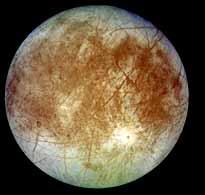This is what researchers at Tucson University claim based on images taken by the Galileo spacecraft
Avi Blizovsky

The prospect of finding life on another planet has received a boost. Data from the Galileo spacecraft, which has been traveling through the system of Jupiter and its moons for several years, reinforces the possibility that the Jupiter moon Europa has an ocean with conditions similar to those of Earth. This is what the BBC website says.
Europa is the only body, other than Earth, that may contain a large amount of liquid water. He is also the leading candidate for the possibility of extraterrestrial life. The absence of impact craters from meteors leads to the hypothesis that the surface of the moon is extremely young.
Scientists in the US now believe that the ice sheet surrounding Europe is extremely thin. The ice sheet looks as if it is full of cracks and oozes, which allows gases, heat and organic matter to reach the water below.
This means - conditions and environment suitable for life.
Dr. Richard Greenberg from the University of Arizona in Tucson and his team came to this conclusion after viewing images of the moon's cracked surface.
Dr. Greenberg's team believes that Europa's sea is parallel to the Earth's icy oceans, such as the Arctic Ocean and icy seas in Antarctica. It is possible that they are similar to Lake Vostok - a lake trapped in deep ice in Antarctica. This lake is the deepest body of fresh water on earth. It serves as a model for an ice-covered lake throughout the solar system. Some have even suggested checking if the lake contains living creatures that have yet to be discovered. However, Lake Vostok is now considered a lake isolated from the influence of the surface to the point that it does not contain more than primitive creatures.
Europe, on the other hand, is more like the Arctic Ocean, the smallest ocean on Earth, which surrounds the North Pole. This ocean is exposed to air and heat through cracks and melting ice. The ocean on Europa appears to be exposed to external influence through fissures, hot springs and tidal changes.
Another interesting possibility is that sulfur found in the clouds on another Jupiter moon, Io, could cross space to Europa. "If we have a source of sulfur, it can help promote life on Europa," says Dr. Keenan Ellis-Evans from the British Antarctic Research Center.
Astrobiologists believed that the ice sheet covering the moon was too thick to allow anything to penetrate. The new research will now give them food for thought. This suggests that the conditions would allow for life," says Dr. Mark Burchell, a space scientist at Ketten University in Ketnerbury, UK. One scenario is that a meteorite crashing into Europa's ocean carries the building blocks of life. Dust and meteorites carrying organic matter or other materials essential to life drift in some form into the ocean. said.
The US space agency is seriously considering sending a robotic spacecraft to Europe to dig through the ice. The study published in the US journal Reviews of Geophysics will give credit points to the proponents of this program.
